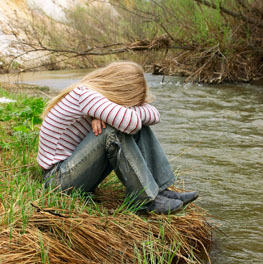
Child sexual abuse is a serious issue that affects a significant number of children. 1 in 3 girls and 1 in 6 boys will be impacted by sexual violence before the age of 18. It is important for children to understand what sexual abuse is so they have the language to properly talk about their bodies and be able to openly explain if something has happened to them so they can get the support they need to live healthy, abuse-free lives.
Although adults may find it difficult to discuss sexual abuse with children, it is a conversation that needs to happen as until we break the silence around this crime, acts of violence against children will continue to happen in secrecy.
Child sexual abuse myths
Myth: Most children are sexually abused by strangers.85 per cent of the time, the offender is someone that the child knows and trusts.
Myth: Children often lie about being sexually abused.
In child sexual abuse cases reported to Children’s Services in 1998, 4 per cent of those cases were considered intentional ‘false allegations’ (Vine, Trocmé and Finlay, 2006).
Myth: Most parents would know if their child had been sexually abused.
Disclosure can be very traumatic for a child, and a large majority of children never tell anyone about the abuse - even their parents. This may include reasons like experiencing fear of not being believed; being blamed; showing disloyalty to their abuser or family; believing the abuse is their fault/that they could have done something to stop it; or they may unconsciously block out the abuse entirely.
Myth: Discussing child sexual abuse with children will make them afraid of ‘good’ touches from well-meaning and caring people.
Children often know the difference between appropriate and inappropriate touches from a very early age. Talking with children early about body boundaries and properly naming their body parts will give children the language they need to tell someone they trust if someone makes them feel uncomfortable.
Indicators of child sexual abuse
Most indicators of child sexual abuse are common coping strategies for children when they experience stress in their lives.
Here are a few that may indicate abuse:
Signs of physical injury or illness
Unhappiness
Regression
Changes at school
Withdrawal
Aggression
Destructive behavior
Sexual acting out
If a child is engaging in one or two of these behaviors, it doesn’t necessarily mean they are being abused, but may be indicative of stress in a child’s life, which still requires intervention.
What makes children vulnerable?
The following are a few examples that increase children’s vulnerability to offenders:
Children are dependent and taught blind obedience to parents/caregivers/adults.
Adults are physically, mentally and emotionally stronger.
Children are taught about the dangers of strangers, but often not taught about body boundaries from family members and family members’ close friends.
Children may not know what child sexual abuse is and may have been told that what they are experiencing is normal and happens to all kids.
Children are often not believed when they do tell.
How to support a child who has been sexually abused
Children have the ability to overcome challenges after experiencing trauma and with the proper support, can still go on to lead positive, healthy lives.
Many factors can contribute to a child’s ability to heal. If a child discloses they have been abused, they need to know:
They are believed.
They are safe.
They did the right thing by telling/showing they needed help.
They are very brave for telling/showing they needed help.
The abuse was in no way their fault.
They are not alone.
They are much more than the abuse they experienced.
Putting an end to child sexual abuse takes a community response. We all need to educate ourselves on this issue and engage in healthy conversations with our children about consent and body boundaries at a young age to decrease the stigma, shame and silence that coincides with this crime.
Calgary Communities Against Sexual Abuse (CCASA) is the primary sexual assault and sexual abuse crisis and education service provider for Calgary and surrounding areas. For more information on CCASA programs and services or to learn about how to engage in healthy conversations with your child, visit www.calgarycasa.com or call the support and information line at 403-237-5888.
Calgary’s Child Magazine © 2024 Calgary’s Child